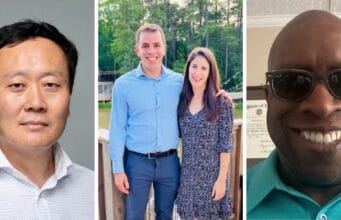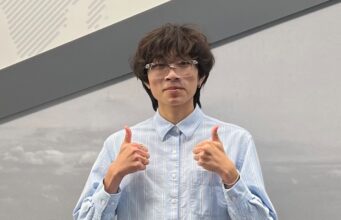Reducing food waste, eradicating scar tissue, expediting emergency services—what do these disparate causes have in common?
All of these solutions—and more—were presented at the 2025 RAISE Forum (Retention and Advancement for the Southeast at Emory) this past November. This hallmark event of Emory University’s Goizueta Business School brought together a dynamic mix of entrepreneurs, investors, and students. Now housed under the Center for Alternative Investments, the annual forum continues its mission to catalyze the Southeastern startup ecosystem while providing Goizueta students with unmatched experiential learning opportunities.
Raising the Profile of Atlanta’s Business Landscape
Now in its 11th year, the RAISE Forum is going strong, says Professor in the Practice of Finance and Executive Director of the Center for Alternative Investments Klaas Baks.

“My colleague Charlie Goetz has been a driving force in bringing this program to Emory—I consider this event to be Charlie’s brainchild,” says Baks “I would describe myself as the ‘finance guy,’ while Charlie is the ‘entrepreneurship guy.’”
The RAISE Forum is not dissimilar to the setup of the show Shark Tank. Its focus, though, is on connecting Southeastern startups with investors who are equally committed to the region’s growth. This year’s event featured seven startup companies pitching to 39 investors. Their specialties ran the gamut of industries, including healthcare, software, logistics, and even food circularity and waste reduction, showcasing the Southeast’s entrepreneurial depth.

“Most companies are pretty niche, and they’re working to improve all kinds of issues,” says Rowland Lewis 25MBA, one of the event’s primary student organizers. “For example, one startup created a simple minimally invasive way to disrupt scar tissue from forming when performing surgery with a unique tool that almost looked like a toothbrush.”
This year’s forum showcased startups like Good Agriculture, offering scalable, tech-enabled platforms for farmers to manage back-office tasks and improve profitability; EVQLV, revolutionizing antibody discovery in healthcare with AI to reduce timelines and increase success rates; and TendoNova, a med-tech company developing micro-invasive tools described by Rowland above. Other standout startups included Goodr, a logistics-based solution tackling food waste and hunger, and Smart Response, which applies AI and patented communication tools to enhance emergency response and 911 call efficiency.
From Probable to Pitch-Perfect
The RAISE Forum’s impact extends beyond pitch day. The process begins with an intensive application review, during which selected companies receive hands-on support to refine their pitches. Those companies selected participate in a preparatory mini-course to hone their presentation skills, focusing on crafting concise, impactful messages for investors.
“The presentations are only 10–12 minutes long, so every moment counts,” said Baks. “We help entrepreneurs build the strongest case for their company in a way that resonates with investors.”
“The Southeast gets less attention than other parts of the country,” Baks noted, “but the energy and innovation here are undeniable. This event helps companies secure critical funding while giving our students exposure to real-world investing and entrepreneurship.”
Experiential Learning in Action
Picture medical students. We hold them to a high standard; when training future doctors, medical students engage in “rounds,” observing professionals in action as they treat real patients in clinic or perform surgery in an operating room.
Goizueta sets a similar standard for their students with opportunities like the RAISE Forum. The forum is much more than just a simple simulation. RAISE provides a genuine opportunity for start-ups in the Southeast to find the funding they need and for investors to continue transforming the entrepreneurial landscape—while permitting students a golden experiential learning opportunity.
“The startup scene is competitive and exciting. It’s a difficult area to transition to, and our goal is to help launch students into these careers,” says Baks.
The forum is part of the school’s Entrepreneurial Practicum course, allowing students to engage directly with both startups and investors. Students assist in organizing the event, observe entrepreneurial training sessions, and gain access to exclusive investor discussions.
According to Baks, “Students see the interplay between entrepreneurs presenting their visions and investors analyzing the risks and opportunities. They learn to ask critical questions: Is the market big enough? Is the product proven? Is this the right team to bring this to success?”
Rowland echoed the excitement: “Being in the room with bona fide entrepreneurs and investors is exhilarating. It’s an unparalleled opportunity to network, learn, and observe the questions that really matter to investors.”
Strengthening the Southeast Ecosystem

The RAISE Forum remains committed to bolstering the Southeastern United States by requiring participating companies to remain in the region for at least five years if funded. This ensures that the innovation and economic benefits stay local, creating a robust entrepreneurial ecosystem.
Sponsors such as Trevelino/Keller, Warren Averett, and Thompson Hine continue to provide critical support, while Emory alumni investors like Sig Mosley 68BBA (Mosley Ventures) and Jason Kuo 19MBA (Tech Square Ventures) underscore the university’s deep ties to the startup community.
For many involved, the RAISE Forum is more than an event—it’s a career-defining experience. Rowland highlighted the mentorship from president of the Keiretsu Forum Atlanta and co-founder of the RAISE Forum Barry Etra and the collaborative opportunities with peers like Patrick Latting 25BBA and Andrew Rothberg 26MBA as yet another asset of the program that just can’t be replicated in a traditional classroom alone.
“We get to expose our students to the real world,” says Baks. “I love it.”
Established in 2008, the Center for Alternative Investments drives innovation and collaboration in private equity, hedge funds, venture capital, and real estate. Explore how the center is shaping the future of finance and join the conversation here.











